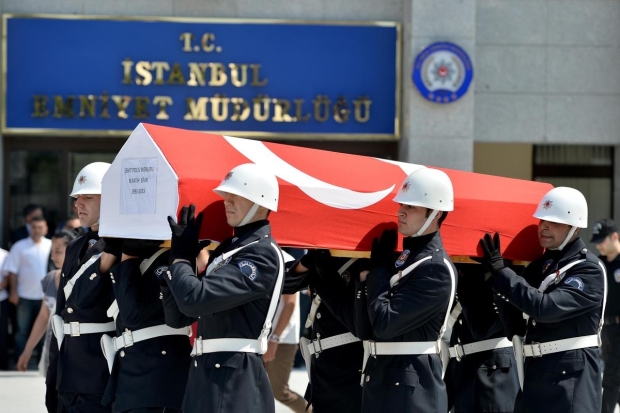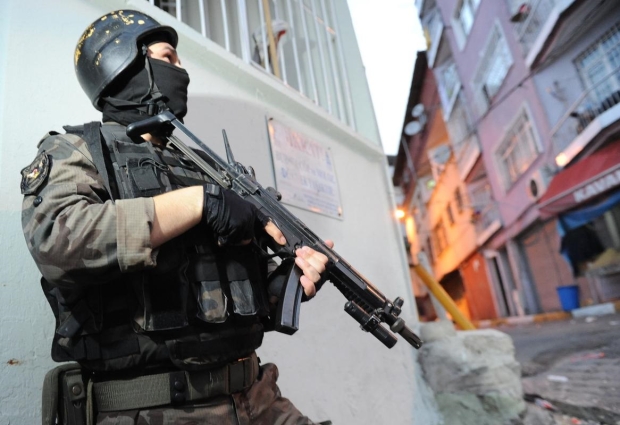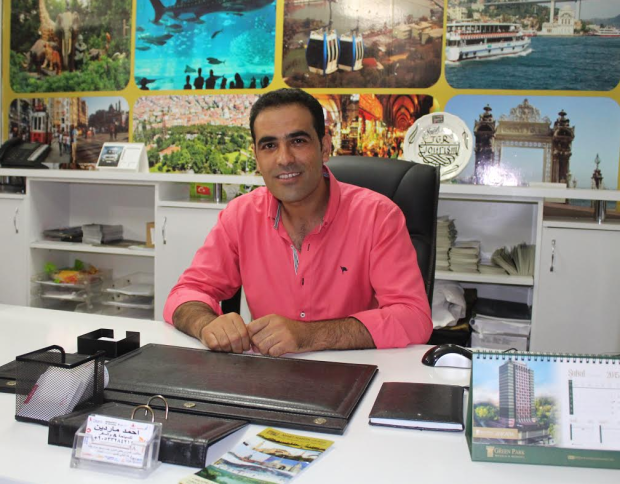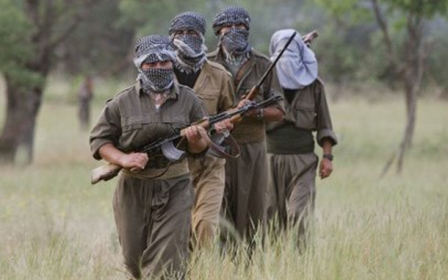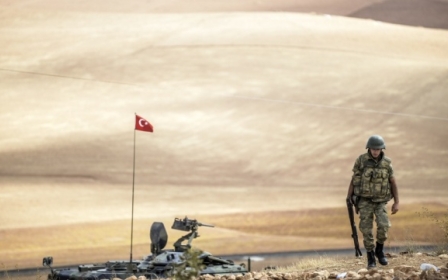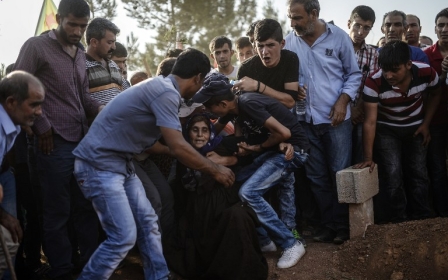Istanbul's citizens remain defiant despite recent bomb scares
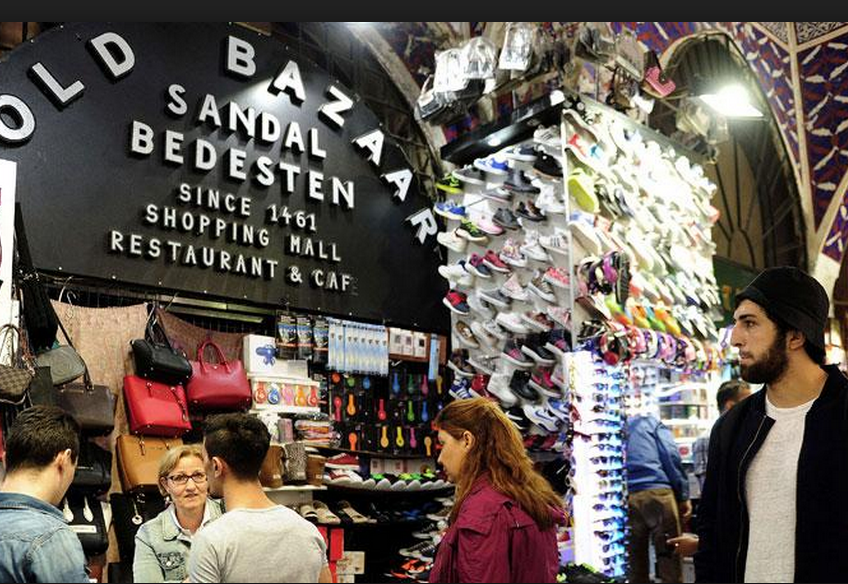
ISTANBUL, Turkey – Mustafa is a sprightly, candid man in his twenties. He’s usually busy tending to his customers at La Viola, a restaurant he co-owns in central Istanbul.
The task is no easy feat, and he has little time to chit chat with journalists or concern himself in politics too deeply, but this weekend was different. Even he admits he had started to worry that the tensions on Turkey’s southern border and its Kurdish minority might spill over and infect his busy little corner of this sprawling metropolis.
He expressed concerns that militants might attack different sites in Istanbul, and shared a tip-off from a “friend who works in security” to avoid the city’s famed Taksim Square at all costs.
“We can only hope for the best,” he told Middle East Eye at the time.
He was by no means the only one to be concerned. Most likely, Mustafa’s friend - like so many other Turks – had caught wind of widespread reports warning of a possible attack on Istanbul’s underground, including Taksim Square.
The reports came from a document signed by deputy chief of Istanbul police dated 25 July warning all security units in Istanbul of possible bomb attacks on Yenikapı, Haciosman, Osmanbey, Taksim metro lines and metrobus stops.
As soon as the documents were leaked to the press, rumours began to circulate that things were about to take a turn for the worse.
Coming just days after Turkey began unprecedented airstrikes on Islamic State (IS) positions in northern Syria and on Kurdistan Workers’ Party (PKK) targets in northern Iraq, there suddenly seemed a lot to be afraid of.
Last week, a suspected IS suicide bomber killed 32 people at a pro-Kurdish rally in the southern border town of Suruc, while subsequent PKK attacks on Turkish security officials - launched in response to Ankara’s perceived inaction over IS - have rocked southern Turkey.
In total, four police officers and four soldiers have been killed by armed groups in Turkey in the last two weeks.
There have also been a number of bomb threats over the past week including two in Istanbul on Tuesday. Foreign governments have now started to fan the panic, with the UK warning its citizens to avoid all public transport in Turkey, which is visited by some 2.5 million Brits every year.
Authorities react
The authorities have responded by placing security services on high alert dramatically stepped up vigilance, in both obvious and subtle ways.
As Muharrem Albayrat, who works at a popular confectionary shop just off Istiklal told MEE, Turkish police, with their navy outfits and protective jackets, are easy to spot.
During protests, which happen regularly on Istiklal, they emerge in droves from nearby police stations. But there are also countless plain clothed security officers, sometimes thwarting their camouflage with walkie-talkies, looking out for anything awry.
Since the escalation began last week, the authorities have issued repeated statements about the number of arrests and security operations. More than 1,000 people have now been scooped up in counter-terrorist operations aimed at IS, PKK and Revolutionary People's Liberation Party-Front (DHKP-C) supporters, the authorities said.
The latter two groups have carried out attacks in Istanbul in the past, while the recent crackdown on IS, backed by stepped-up Turkish airstrikes on IS positions in Syria, have spawned concern of a backlash inside Turkey.
“The Islamic State used to be our neighbours’ problem. But now it has become Turkey’s problem,” lamented 24-year-old Volcan Konucku, who sells dishes of chicken with rice and chickpeas from a cart off Istiklal, a shopping hub and arguably Istanbul’s most famous street.
Konucku says he is anxious about attacks in the city, especially since Suruc.
“Now I avoid crowds and try to avoid busy streets,” he added.
Konucku says he’s noticed a drop in the number of pedestrians on Istiklal and the surrounding neighbourhood in recent days, but for a vendor in the heart of a city with a population of some 17 million, escaping crowds remains an insurmountable task.
Life goes on as before
If Konucku’s assessment is to be believed, the drop is only marginal. Istanbul residents sometimes lament that Istiklal turns into a river of people, and on Tuesday evening – despite the rumours and the warnings - the river was flowing thick. People largely say they have heard the warnings, but that they plan to continue with their daily routines at least for now.
Lining the street and its environs was the usual eclectic mix of tourists and locals, with waiters in adjacent restaurants beckoning passers with promises of shisha pipes and sweet delights. Cart-wielding vendors, street performers and child beggars - tragically more numerous since the beginning of the Syrian war - completed what is a typical scene on Istanbul’s busiest street.
In Taksim Square, at one end of Istiklal, dozens of people relaxed on the few grassy areas around the Republican Monument, a statue commemorating the foundation of the Turkish state and the square’s centrepiece. A stone’s throw away on the banks of Gezi Park - a modest-sized green space known as the epicentre of major protests against the government that took root in May 2013, dozens more lay gazing at the sky.
Erkan Sarac, who works at the reception desk at the adjacent Taksim Hill Hotel, dismissed the idea that recent security developments have impacted the hotel business in the area. “We are fully booked,” he told MEE.
“During the Gezi events we lost a lot of business, but now no.”
Across the square in Talimhane, past taxi lines and commuters taking the escalators to the metro, Ali Al-Azzo - a Syrian who works for the El Asima travel agency – said he was not scared that hostilities in his home country would engulf Turkey.
Azzo stressed he was sure that the Turkish authorities were in control of security in Istanbul, particularly in key tourist areas. He said he only had one call from a customer who was worried about the security situation.
“He called me from Saudi Arabia after hearing about security problems in Turkey on TV. Of course I reassured him that Istanbul is safe, and that everything is peaceful here.”
It remains to be seen if demand will stay buoyant. Some of the more alarmist European papers have been busy printing headlines claiming that up to two-thirds of holiday-makers were now scared of IS in Turkey, but authorities here have shown themselves more than willing to try secure the Turkish metropolis.
More than 12.5 million people are forecast to visit the city this year, making it the fifth most visited city in the world, according to the MasterCard Global Destinations Cities Index released last month.
An IS or PKK attack would undermine this bright outlook and deal a further blow to Turkey’s already weak currency. As soon as the horror of the Suruc attack became clear, the Lira dropped to its lowest point in over a month.
But some residents are so optimistic they believe that even an attack could not derail this rosy outlook. Albayrat, who works at a confectionary shop just off Istiklal, is confident that Turkish authorities will maintain security in the city, and says that he believes Istanbul will remain resilient as it has done in the past.
He stresses tourists have kept flowing to Istanbul despite a suicide attack on a police station in the touristic area of Sultanahmet in January this year, and that his business hasn’t been affected in anyway by the recent security developments. People are clearly coming in and out, and Albayrat soon says he does not have time to talk and needs to help his customers.
After his brief weekend scare, La Viola’s Mustafa also seems to be embracing a similar kind of attitude.
Days after the warnings from his friend, he says he is as busy as ever and by Tuesday evening he had grown almost dismissive of his earlier concerns.
“Of course business is good - look around you,” he said, grinning cheekily while balancing a plate between his bicep and forearm so he could carry another one with his free hand.
"Are you going to ask me questions all night or can I get you something to eat?"
New MEE newsletter: Jerusalem Dispatch
Sign up to get the latest insights and analysis on Israel-Palestine, alongside Turkey Unpacked and other MEE newsletters
Middle East Eye delivers independent and unrivalled coverage and analysis of the Middle East, North Africa and beyond. To learn more about republishing this content and the associated fees, please fill out this form. More about MEE can be found here.


